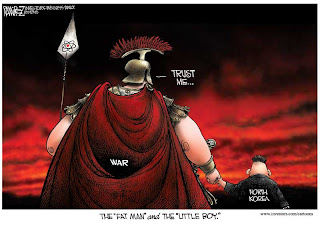In an email sharing the below story, a very dear friend of mine, who has spent his entire professional life studying the politics and cultures of the Middle East, had this to say about Kaminski's coverage of Prof. Donald Kagan's farewell lecture: "Possibly the most important article published this year."
I'll be looking for a transcript of the lecture but until then, Kaminski's overview is quite enough to convey the primary themes and import of the points Kagan was trying to convey: the importance of America's role as defender of Western democracy, the difficulty in doing such, the fragility of the form of democracy itself even while it is the most powerful form of government in providing the greatest opportunity for the greatest number of people, the fundamental importance of education in making our citizenry aware of all of this (especially with respect to democracy's foundation and the nature of its development over the centuries), and the roles both society and our educational establishment have in preserving all of this.
The greatest threat to America comes not from any external actor, condition, or influence but rather from the steady growth of a sense of entitlement among our people and the corresponding decay in individual and collective responsibility for doing what is necessary to preserve and promote the ideals of democracy as it is practiced by our Republic.
Just a couple of days ago, Former President George W. Bush briefly spoke at the opening of his library. Here is an excerpt from his speech:
In democracy, the purpose of public office is not to fulfill personal ambition. Elected officials must serve a cause greater themselves. The political winds blow left and right, polls rise and fall, supporters come and go. But in the end, leaders are defined by the convictions they hold. And my deepest conviction, the guiding principle of the administration, is that the United States of America must strive to expand the reach of freedom.
I believe that freedom is a gift from God and the hope of every human heart. Freedom inspired our founders and preserved our union through civil war and secured the promise of civil rights. Freedom sustains dissonance bound by chains. Believers huddled in underground churches. And voters who risked their lives to cast their ballots. Freedom unleashed creativity, rewards innovation and replaces poverty with prosperity. And ultimately freedom lights the path to peace. Freedom brings responsibility.
...I dedicate this library with an unshakeable faith in the future of our country. It's the honor of a lifetime to lead a country as brave and as noble as the United States. Whatever challenges come before us, I will always believe our nation's best day lie ahead. God bless.
Like our forty-third President, I, too, believe that "our nation's best day[s] lie ahead" but I also know that there are no guarantees about the future. The opportunity, hope and promise that America has symbolized for so many millions of people cannot withstand general public apathy, selfishness, indiscipline, and abrogation of both civic responsibility and a constantly renewed commitment to our founding principles. We simply have to do better than what we are doing now.
For your consideration:
Donald Kagan, Yale's great classicist gives his final lecture, fighting as ever for Western civilization.
By MATTHEW KAMINSKI
New Haven, Conn.
Donald Kagan is engaging in one last argument. For his "farewell lecture" here at Yale on Thursday afternoon, the 80-year-old scholar of ancient Greece—whose four-volume history of the Peloponnesian War inspired comparisons to Edward Gibbon's Roman history—uncorked a biting critique of American higher education.
Universities, he proposed, are failing students and hurting American democracy. Curricula are "individualized, unfocused and scattered." On campus, he said, "I find a kind of cultural void, an ignorance of the past, a sense of rootlessness and aimlessness." Rare are "faculty with atypical views," he charged. "Still rarer is an informed understanding of the traditions and institutions of our Western civilization and of our country and an appreciation of their special qualities and values." He counseled schools to adopt "a common core of studies" in the history, literature and philosophy "of our culture." By "our" he means Western.




